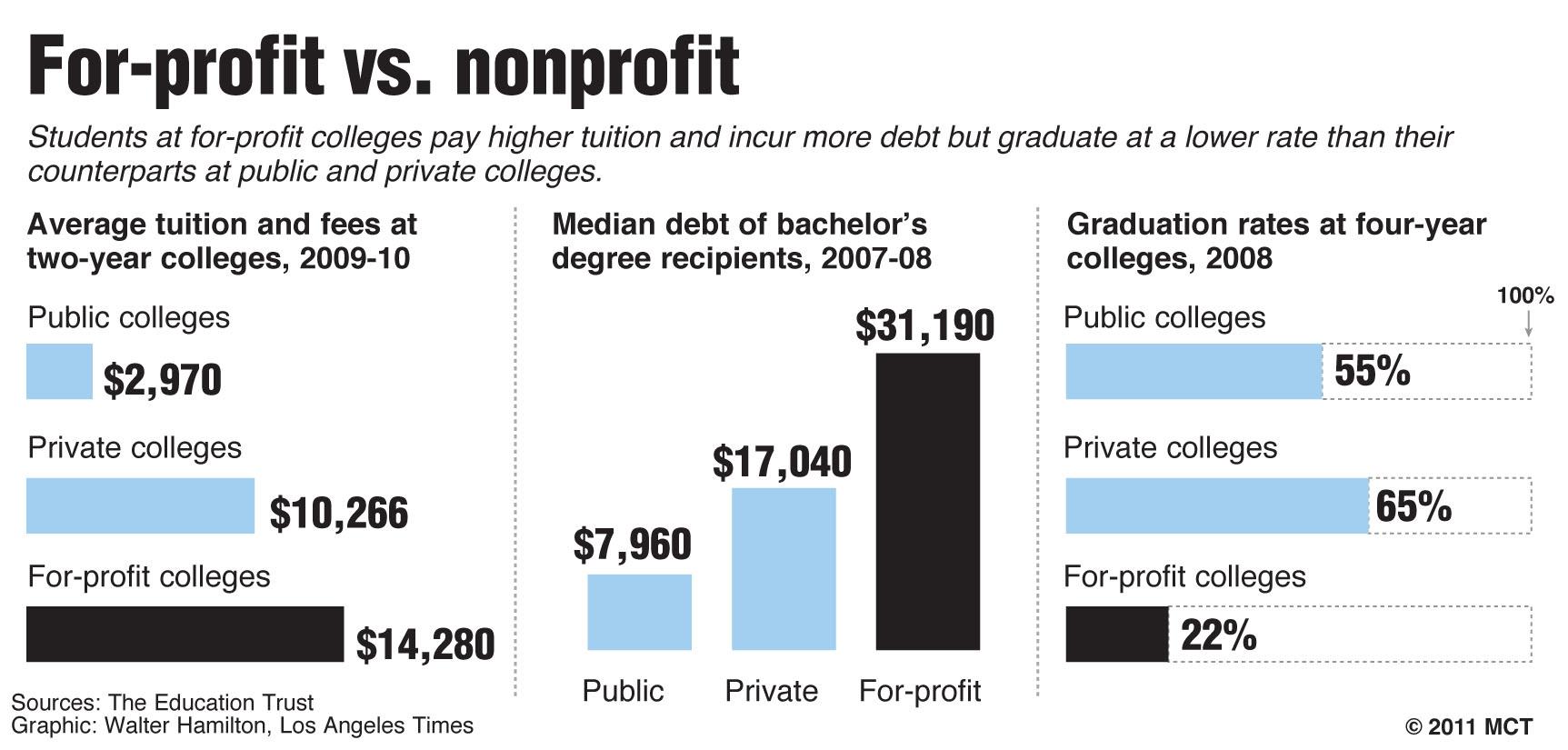
By BRIAN KIM
Staff Writer
At this point in high school, it’s extremely likely that you have, at some point, heard some alarming statistics about your potential financial situation after you graduate college.
As current projections go, two-thirds of all college graduates are going to be burdened with some form of college debt, and according to Forbes, the average borrower will graduate $26,600.
With this in mind, it might be easy to see for-profit colleges as a safer alternative to traditional colleges. For-profit colleges are colleges that run as businesses, with owners and shareholders for whom the college must generate a profit. These colleges certainly work to present themselves as a higher education for students who struggled in high school but are still determined to create a better future for themselves. They promise an affordable, practical education with a high probability of being placed in the field that you’re ultimately hoping to work in. It sounds like a great deal, except for the part where it’s almost entirely untrue.
Consider for-profit law schools. In 2016, the National Conference of Bar Examiners reported that 69 percent of first-time testers passed the bar exam nationally. In contrast, The Atlantic discovered that one such institution, Florida Coastal, admitted classes where more than half of the class were unlikely to ever pass the bar exam. These colleges often reply to such allegations by pointing to their successful job placements rates. Corinthian Colleges, when pressed by CNN over the accusations of a former student, described their 75 percent successful job placement rate as “a strong outcome for any educational program.” However, given the private nature of these colleges, it is usually difficult to verify these numbers. It is important to note that in recent years, the Federal Trade Commission has sued different for-profit colleges for, among other exaggerations, classifying a business major being hired as a waiter as an “in-field” placement or being hired at a Taco Bell as a successful job placement.
Mounting evidence suggests that graduating from a for-profit college may even be dangerous for future employment prospects due to the stigma surrounding them. Graduates interviewed by news sources have reported that many employers do not view for-profit degrees as credible and some have even gone so far as to claim that they would have been better off without those degrees. The numbers seem to back them up: 72% of the programs offered by for-profit colleges earn less than high school dropouts, according to The Atlantic.
In addition to these institutions’ inability to educate their students as promised, for-profit colleges are also notorious for targeting vulnerable students who will have difficulty paying off the debts that they will be forced to take on to get through college. Historically, this has included predominantly low-income and minority students, and more recently, they have begun to aggressively target veterans, according to NPR. These all paint a picture of an educational system that survives through predatory tactics on its own students, a system that any student would tacitly support by going entering. Any school that operates on such a model not only benefits from the chronic injustices in American society, but perpetuates them. By bleeding at-risk students of precious capital and leaving them in debt with a worthless degree that offers no help in the job market, for-profit colleges make themselves part of the endemic problem of poverty that often becomes impossible to overcome in today’s economy.
Of course, there are examples of for-profit colleges that make a genuine effort to provide a unique and ultimately beneficial education. Strayer University, in 2015, collaborated with Fiat Chrysler Automobiles to lower costs of attendance for all car-dealership employees and their immediate family members. However, these instances are by far the rare exceptions to the rule.
In recent years, for-profit colleges have seen increasing regulation on the part of the government, but it is important to consider that the appearance of these colleges is still part of a trend that has seen American education become more and more focused on making money. It is fairly well-known that college tuition has risen a staggering amount in the past decades, far outstripping the average household income. However, Forbes reports that actual education spending has remained the same, or even begun to taper off, particularly since outside sources of revenue such as state subsidies have dried up.
Though some could say that a higher level of competition created by a business model will lead to improved education quality throughout the country, they ignore the fact that such a model makes education vulnerable to many of the pitfalls of modern business that have led to the prioritization of profit margins over customer satisfaction. Especially with the gainful employment regulations that were passed in 2015, it has become clear how ineffective for-profit colleges are.
Unfortunately, recent deregulation efforts under the current administration’s Department of Education have led to increased interest in the resurrection of this business model. As a result, it has become more important for prospective college students to be more aware of the relative costs and benefits of different choices for colleges. In summary, if you’re considering a for-profit college education, it might be safer just to pass.
Categories:
Are for-profit colleges worth the price of admission?
October 16, 2017
1
0
Donate to Sword & Shield
$180
$1000
Contributed
Our Goal
Your donation will support the student journalists of University High School. Your contribution will allow us to purchase equipment and cover our annual website hosting costs.








